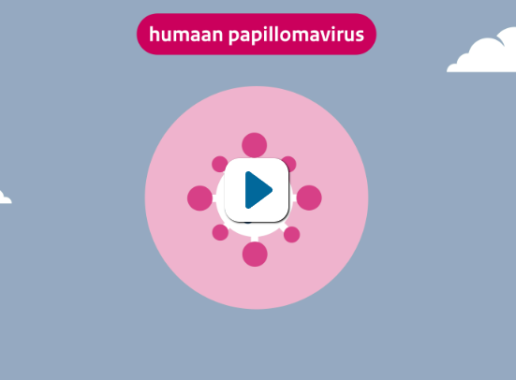HPV in summary
| Most common symptoms | An infection can lead to genital warts. It can also lead to various types of HPV-related cancer, such as cancer of the cervix, mouth and throat, vagina, labia, anus or penis. |
|---|---|
| Which vaccinations protect against this disease? | HPV vaccination |
What is HPV?
This infectious disease is caused by a virus: the human papillomavirus (HPV). The virus does not usually cause any symptoms, but it is very contagious. If you have HPV, it is easy to infect others accidentally. There are various types of HPV infections. The two most dangerous are type 16 and type 18, because these types are most likely to lead to cancer. Cervical cancer is the best-known form caused by HPV.
Cancer caused by HPV
Eight in ten people become infected with HPV at least once in their lives. Not all of them become ill, because your body usually cleans up the virus on its own. For 10 to 20% of people who are infected, this does not happen. That means that the virus has a chance to affect healthy cells. If the virus causes lots of damage, those cells may later develop into cancer. If that happens, it takes 10 to 15 years before cancer develops.
Symptoms in men and women
HPV can infect cells in your cervix, genitals, mouth and throat. An HPV infection often goes unnoticed. You will not usually have any symptoms if you are infected. Your body almost always clears up the HPV infection on its own within 2 years. Sometimes, the body does not remove the virus on its own. If that happens, HPV can cause genital warts, and eventually lead to cancer.
- Genital warts. Genital warts are mainly caused by the low-risk variants of HPV. The first symptoms are genital itching and irritation. Sometimes there is only one wart, but you may get many warts within a short time frame.
- Cancer. The high-risk variants of HPV can cause cancer. The most common form of cancer related to HPV is cervical cancer.
Symptoms in women
Women may develop:
- Cervical cancer
- Cancer of the mouth and throat
- Cancer of the vagina
- Cancer of the labia
- Cancer of the anus
Women can have various symptoms:
- Burning sensation
- Discharge
- Bleeding
- Pain and abnormalities of the labia, cervix or other parts of the genitals
Symptoms are often not immediately recognised as relevant. That means it can take a long time to get the right diagnosis.
Cervical cancer and population screening
Cervical cancer is the most common form of cancer caused by HPV. If it is detected early, this type of cancer is usually treatable. This is why women over 30 years old are invited to participate in the population screening programme for cervical cancer every five years. Even if you have had the HPV vaccinations, it is still important to participate in this population screening. Vaccination cannot prevent all forms of HPV-related cancers.
Symptoms in men
Men may develop:
- cancer of the mouth and throat
- cancer of the penis
- cancer of the anus
Men can have various symptoms:
- burning sensation
- discharge
- bleeding
- pain and abnormalities of the penis, anus or other parts of the genitals
Symptoms are often not immediately recognised as relevant. That means it can take a long time to get the right diagnosis.
People often think that HPV is transmitted through sex, but not penetrative intercourse is not the only way to get the virus. You can also get HPV by making out or engaging in foreplay with a person who is infected. In that case, HPV is transmitted through contact between hands, skin and mouths. HPV is very common. The person you are with may be carrying the virus without even knowing it – and could also infect you.
What is HPV?
HPV is short for human papillomavirus. HPV is very common. There are more than 100 different types of HPV. Some types of HPV can cause cancer many years later. The most common form of cancer related to HPV is cervical cancer. Other forms include cancer in the vagina, labia, anus, penis, mouth and throat.
Is HPV dangerous?
There are more than 100 types of HPV, and not all of them are dangerous. HPV types 16 and 18 are the ones most likely to cause cancer. Together, these types cause about 70% of all cases of cervical cancer and the majority of other HPV-related cancers.
What does HPV do in the human body?
HPV can infect cells in your cervix, genitals, mouth and throat. An HPV infection often goes unnoticed. You will not usually have any symptoms if you are infected. Your body almost always clears up the HPV infection on its own within 1 or 2 years. For 10 to 20% of people who are infected, this does not happen. After many years, these people could develop cancer.
There are thirteen high-risk variants of HPV that can cause cancer. The most common form of HPV-related cancer is cervical cancer. Other forms include cancer in the vagina, labia, anus, penis, mouth and throat.
There are also low-risk types of HPV. They can cause genital warts. The first symptoms are genital itching and irritation. Sometimes there is only one wart, but you may get many warts within a short time frame. Genital warts are very likely to come back, even after treatment.
How does HPV stay alive on the skin and mucous membranes?
In an infected person, the virus can be found in the mucous membranes of the cervix, genitals, mouth and throat.
Exactly how does cancer develop after an HPV infection?
In about 10% to 20% of people who are infected, your body does not clear the HPV infection, so the virus stays in the cells for longer. When that happens, the virus can change the cells. These abnormal cells also often go away on their own. If they do not, these abnormal cells can develop into precancerous cells or cancer. The time between infection and cancer is usually at least 10 to 15 years.
What are precancerous stages?
In a precancerous stage, there are abnormal cells that show different growth patterns. These abnormal cells could potentially go away on their own, if the body’s immune system clears them out. However, after many years, these cells could also turn into cancerous cells. The risk of cancer depends on where the cells are growing, and how abnormal the cells are.
What determines whether or not an HPV infection will cause cancer?
That depends on many different factors. People with weaker immune systems and people who smoke are more likely to develop health conditions resulting from HPV infection.
Can young children (aged 10 and older) get HPV?
The high-risk types of HPV (which can cause cancer many years later) are transmitted through direct contact with skin, or contact between skin and mucous membranes around the genitals, mouth and throat. This makes it very unlikely that young children will be exposed to a high-risk HPV infection.





